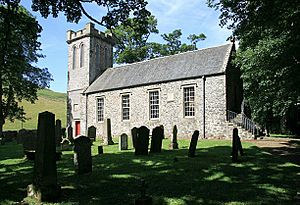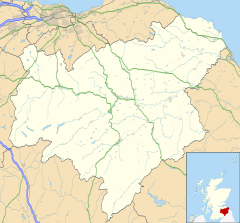Ettrick, Scotland facts for kids
Quick facts for kids Ettrick
|
|
|---|---|
 Ettrick Parish Church |
|
| Population | 105 (2001) |
| OS grid reference | NT471288 |
| Civil parish |
|
| Council area | |
| Lieutenancy area |
|
| Country | Scotland |
| Sovereign state | United Kingdom |
| Post town | Selkirk |
| Postcode district | TD7 |
| Police | Lothian and Borders |
| Fire | Lothian and Borders |
| Ambulance | Scottish |
| EU Parliament | Scotland |
| UK Parliament |
|
| Scottish Parliament | |
Ettrick (called Eadaraig in Scottish Gaelic) is a small village in the Scottish Borders area of Scotland. It is also a civil parish, which is like a local district. You can find Ettrick on the B709 road, about 28 kilometers (17 miles) southwest of the town of Selkirk.
Contents
Exploring the Ettrick Area
This section will tell you more about the natural features and history of the Ettrick valley.
The Ettrick Water River
The Ettrick Water is a river that flows right through the Ettrick Valley. It crosses a flat area called the Ettrick Marshes. This river is known for being the second fastest rising river in Scotland. It flows past the village of Ettrickbridge and then reaches the old town of Selkirk.
Ettrick Forest: A Look Back in Time
Long ago, Ettrick Forest was a huge Royal forest. A royal forest was an area set aside for hunting by royalty. Today, much of this forest has disappeared. This happened because of sheep farming and also due to logging for wood.
However, you can still find parts of the old forest. Look along the banks of the Ettrick Water and in the deep ravines of its smaller streams. These places were hard for sheep to reach and not very interesting for loggers. Here, you can still see the types of plants and trees that made up the ancient forest.
Farming and Tourism in Ettrick
For a long time, the main jobs in Ettrick were hill farming and raising cattle. Hill farming means raising sheep on the hills. These types of farming have always been very important to the area.
In more recent years, something new has become popular: tourism. More and more visitors are coming to Ettrick to enjoy its beautiful scenery and quiet atmosphere.
Ettrick's Famous Literary Connections
The Ettrick area has inspired many writers and poets. Several famous literary figures have connections to this valley.
James Hogg: The Ettrick Shepherd
One of the most famous people from Ettrick is the poet and author James Hogg (1770–1835). He was often called the "Ettrick Shepherd" because he was born on a farm in Ettrick parish. You can visit his burial place in Ettrick Kirkyard.
Ettrick in Famous Books
The Ettrick valley appears in several well-known stories:
- In the books by John Buchan, a fictional estate called "Laverlaw" is set near Ettrick. This estate belongs to a character named Sandy Arbuthnot, Lord Clanroyden.
- Robert Louis Stevenson's famous hero, David Balfour, from the novel Kidnapped, comes from a made-up village called "Essendean" in Ettrick Forest.
- The traditional Scottish folksong, "Ettrick Lady," also mentions the area. The folk band The Corries recorded this song.
- More recently, the Ettrick valley was the setting for a story called "No Advantages." This story is part of Alice Munro's 2006 collection, The View from Castle Rock.
Reverend Thomas Boston: A Thoughtful Leader
Ettrick was also home to a very important Scottish thinker, Reverend Thomas Boston (1676–1732). He was the minister in Ettrick starting in 1707. His most important book, Human Nature in its Fourfold State, was read by many people across Scotland. You can still find copies of this book today.
Tibbie Shiel: A Local Legend
Tibbie Shiel, a person who inspired many stories and writings, was born and is buried here in Ettrick.
 | George Robert Carruthers |
 | Patricia Bath |
 | Jan Ernst Matzeliger |
 | Alexander Miles |


